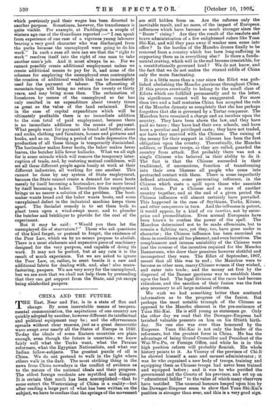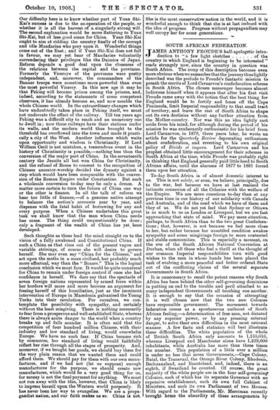CHINA AND THE FUTURE.
THE East, Near and Far, is in a state of flux and change. By some inscrutable means of tempera- mental communication, the aspirations of one country are quickly adopted by another, however different its intellectual and political equipment may be ; and the effervescence spreads without clear reasons, just as a great democratic wave swept over nearly all the States of Europe in 1848. To-day the ideals of some Eastern countries are plain enough, even though the future is unoertain ; we know fairly well what the Turks want, what the Persian reformers, what the Egyptian Nationalists, and what our Indian fellow-subjects. The greatest puzzle of all is China. We do not pretend to walk in the light where others walk in the dark. The most striking thing in the news from China nowadays is the conflict of evidence as to the nature of the national ideals and their progress. The oldest foreign residents are mystified and disagree. It is certain that much has been accomplished—that to. some extent the Westernising of China is a reality—but after reading a large part of what has been written on the subject, we have to confess that the springs of the movement are still bidden from us. Are the reforms only the inevitable result, and'no more, of the impact of European, influences which have become so much stronger since the "Boxer " rising ? Are they the result of the resolute and brave administration of a few enlightened rulers like Yuan Shi-Kai, and will they pass away if weaker men come into office ? Is the burden of the Manchu drones finally to be removed from a country which has been long-suffering in supporting them as in everything else ? Is there a funda- mental craving, which will in the end become irresistible, for a constitutionally governed land ? We do not know, and the fact that we do not makes the eternal riddle of China only the more fascinating.
It is a little more than a year since the Edict was pub- lished abolishing the Manchu garrisons throughout China.. If this proves eventually to belong to the small class of Edicts which are fulfilled permanently and to the letter, its significance cannot well be exaggerated. For more than two and a half centuries China has accepted the rule of the Manchu dynasty so completely that she has perhaps forgotten that she is governed by a, Tartar conqueror. The Manchus have remained a, charge and an incubus upon the country. They have been above the law, and they have paid no taxes ; they have had their own schools, and have been a peculiar and privileged caste ; they have not traded, nor have they married with the Chinese. The raising of the money for their support in idleness has been the first obligation upon the. country. Theoretically, the Manchu. soldiers, or Banner troops, as they are called, guarded the country from attack. But probably there was not a. single Chinese who believed in their ability to do it. The fact is that the Chinese succeeded in their traditional, if unconscious, function of transforming into their own likeness all people who come into protracted contact with them. There is some imperfectly defined attraction, some permeating influence, in the Chinese which casts a spell upon those who associate with them. Put a Chinese and a man of auother country together, and at the end of a given period the Chinese influence will almost certainly have prevailed. This happened in the case of Scythians, Turks, Kitans, and other conquerors in turn. And the influence is potent, it would appear, by a kind of vis inertiae, not by enter- prise and premeditation. Even normal Europeans have been known to confess the power of the spell. The Manchus determined not to be made effeminate, but to remain a fighting race, yet they, too, have gone under in character; the Chinese influence has been exercised on them in conditions all too pleasant, and even luxurious. The complaisance and intense amiability of the Chinese were just the reverse of the incentive required for the Manchu Bannermen, who drew their pensions however slothful and incompetent they were. The Edict of September, 1907, meant that all this was to end ; the Manchus were to become as other men, marry Chinese women if they wished, . and enter into trade ; and the money set free by the dispersal of the Banner garrisons was to establish them upon the land. The legal division of the races had become ridiculous, and the sanction of their fusion was the first step necessary to all large national reforms.
We wish we had something better than scattered information as to the progress of the fusion. But perhaps the most notable triumph of the Chinese as opposed to the Manchu element is the pre-eminence of Yuan Shi-Kai. He is still young as statesmen go. Only the other day we read that the Dowager-Empress had lavished valuable presents on him on his fiftieth birth- day. No one else was ever thus honoured by the Empress. Yuan Shi-Kai is not only the leader of the reformers, but the greatest force in China. He has the advantage of being Grand Councillor and President of the Wai-Wu-Pu, or Foreign Office, and while he is in this high position reform will probably flourish. His whole history points to it. As Viceroy of the province of Chi-li' he showed himself a sane and earnest administrator ; it was he who organised a new body of troops, training and equipping them as Chinese troops had never been trained and equipped before ; and it was he who purified the government and the Courts of his province, and set up an " educational ladder " to the value of which many observers have testified. The unusual honours heaped upon him by the Dowager-Empress seem to show that Yuan Shi-Kai's position is stronger than seer, and this is a very good sign. Our difficulty here is to know whether part of Yuan Shi- Kai's success is due to the co-operation of the people, or whether it is all the harvest of a singularly strong will. The second explanation would be more flattering to Yuan Shi-Kai, but of less good omen for China. Yuan Shi-Kai ought to aim at ridding the country finally of the corrupt and idle Mandarins who prey upon it. Wonderful things come out of the East ; and if Yuan Shi-Kai does not fall in favour, we may yet hear of Mandarins voluntarily surrendering their privileges like the Daimios of Japan. Reform depends a good deal upon the closeness of the relations between the capital and the provinces. Formerly the Viceroys of the provinces were pretty independent, and, moreover, the commanders of the Banner troops were sometimes more powerful than even the most powerful Viceroy. In this new age it may be that Peking will become prince among the princes, and, indeed, according to the statements of some competent observers, it has already become so, and now moulds the whole Chinese world. In the extraordinary changes which have undoubtedly taken place in Peking itself, we must not underrate the effect of the railway. Till ten years ago Peking was a difficult city to reach and au unsavoury one to dwell in ; now three railways have their stations under its walls; and the modern world thus brought to the threshold has overflowed into the town and made it practi- cally a city of the West. Another influence which waits upon opportunity and wisdom is Christianity. If Lord William Cecil is not mistaken, a tremendous event in the history of Christianity is possible,—nothing less than the conversion of the major part of China. In the seventeenth century the Jesuits all but won China for Christianity, and the refusal of Rome to consent to the recognition of Chinese ancestor-worship decided the dynasty against a step which would have been comparable with the conver- sion of the Roman Empire under Constantine. But such a wholesale conversion to-day may be only a dream. A matter more certain to turn the future of Chiva one way or the other is finance. In all the talk of reform we hear too little of finance,---of a genuine native attempt to balance the nation's accounts year by year, and dispense with the fatal habit of borrowing for any and every purpose. When a Chinese undertakes this great task we shall know that the man whom China needs has come. The thing could unquestionably be done ; only a fragment of the wealth of Chiva has yet, been developed.
Such thoughts as these lead the mind straight on to the vision of a fully awakened and Constitutional China. If such a China as that rises out of the present vague and variable strivings, of course she will desire to govern herself. She may even say " China for the Chinese," and act upon the motto in a more civilised, but probably much more effectual, way than the " Boxers." This is the logical conclusion which we must face. It would be quite unnatural for China to remain under foreign control if once she had confidence in herself. We dare say that the spectacle of seven foreign nations represented by armed force within her borders will more and more become an argument for freeing herself of this humiliation, just as the imminent intervention of Europe in Macedonia galvanised the Young Turks into their revolution. For ourselves, we con- template the possibility with sympathy, and certainly without the least misgiving. There is nothing necessarily to fear from a prosperous and well-established State, whereas there is always acute danger to the world when a country breaks up and falls asunder. It is often said that the competition of four hundred million Chinese, with their industry and low standard of living, would overwhelm Europe. We have no such fear. If China became rich by commerce, her standard of living would faithfully reflect her rise through all the stages of prosperity. And, moreover, if we bought her goods, we should buy them for the very plain reason that we wanted them and could afford them. We should pay for them with our own manu- factures, and if we had not (let us suppose) enough manufactures for the purpose, we should create new manufactures, which would be a very good thing for us, for money is not the final payment for anything. We must not run away with the idea, however, that China is likely to impress herself upon the Western world purposely. It has never been her way to evangelise. We are a propa- gandist nation, and our faith makes us so. China is not. She is the most conservative nation in the world, and it is wonderful enough to think that she is at last imbued with the idea of progress. Progress without propagandism may well occupy her for some generations.















































 Previous page
Previous page